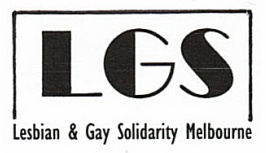


From Avaaz:
Dear friends across Australia,
The laws that protect Australians are under threat. Our anti-smoking laws, the best in the world, could be trampled by Big Tobacco as a US-led trade treaty threatens to put corporations above people. And it's all being written in secret. Send a message now to call on Minister Robb to not sign onto laws we didn't vote for:
Australia has the strongest anti-smoking laws in the world. They’re so successful that other countries want to do the same. But Big Tobacco isn’t happy about this -- and the Australian government is about to agree to a deal that lets them trample all over us whenever they want.
The Trans-Pacific Partnership is a US-driven trade pact that that could let companies sue us to get rid of whichever of our hard-fought protections they don’t like. The whole deal is being negotiated in secret, and this weekend Trade Minister Robb is set to agree to rules none of us had a say in.
But opposition is building in Australia and other countries. The ALP and The Greens have just joined together to demand transparency. Abbott’s team is on the ropes from the Indonesian spying scandal,&nb! sp;let’s use this crucial opportunity to stall the talks and stand up for our health -- send a message to Minister Robb now!
http://www.avaaz.org/en/selling_out_australias_democracy/?bAhVrbb&v=32103
Tobacco giant Philip Morris is suing the government this year for billions of dollars after Australian anti-smoking rules threatened their bottom line. They did it through a loophole that the TPP would turn into floodgates, giving legal rights to foreign corporations to challenge any Australian law they claim would harm their profits in secret international tribunals closed to the public.
And tobacco could be just the start. Leaked TPP drafts read like a corporate wish-list that bends our rules in favour of companies, where everything from medicine to software could end up more expensive for Australian consumers. It’s SO secretive that only a few people in each treaty count! ry have seen the whole thing -- even our lawmakers can’t see the text we’re signing up to, and it’s up to us to stop this secretive treaty before the corporate crackdown.
We’ve known all along that there’s a lot at stake, but have had to rely on leaked snippets like the chapter Wikileaks just published to understand exactly how much. Let’s not stand for this kind of secrecy undermining our democracy -- send a message now to shine a light on the secret treaty:
http://www.avaaz.org/en/selling_out_australias_democracy/?bAhVrbb&v=32103
It can be easy to feel small in the face of big forces, and big interests, driving our governments. But people, not money, are the true source of their power. Last year 750,000 people sent a message to TPP negotiators to stop this deal. Now's the critical moment for us to speak up. Let?! ?s join together, once again, and bring our power to stop this unprecedented threat to our democracies.
With hope,Oliver, Jamie, David, Emily, Allison, Nadia, Alex and the entire Avaaz team
SOURCES
Australians may pay the price in Trans-Pacific Partnership free trade agreement (Sydney Morning Herald) http://www.smh.com.au/federal-politics/political-news/australians-may-pay-the-price-in-transpacific-...
Secret TPP Negotiations Resume in Salt Lake City (Electronic Frontier Foundation) https://www.eff.org/deeplinks/2013/11/secret-tpp-negotiations-resume-salt-lake-city
Secret Trans-Pacific Partnership Agreement (Wikileaks) http://wikileaks! .org/tpp/#QQG6
The Trans-Pacific Partnership treaty is the complete opposite of 'free trade' (The Guardian) http://www.theguardian.com/commentisfree/2013/nov/19/trans-pacific-partnership-corporate-usurp-congress
Support the Avaaz Community!
We're entirely funded by donations and receive no money from governments or corporations. Our dedicated team ensures even the smallest contributions go a long way.
Avaaz.org is a 30-million-person global campaign network that works to ensure that the views and values of the world's people shape global decision-making. ("Avaaz" means "voice" or "song" in many languages.) Avaaz members live in every nation of the world; our team is spread across 18 countries on 6 continents and operates in 17 languages. Learn about some of Avaaz's biggest campaigns here,
**********************************************************************************Together we've raised enough money to run an advertisement in The Australian warning people of what's at stake in the TPP negotiations.
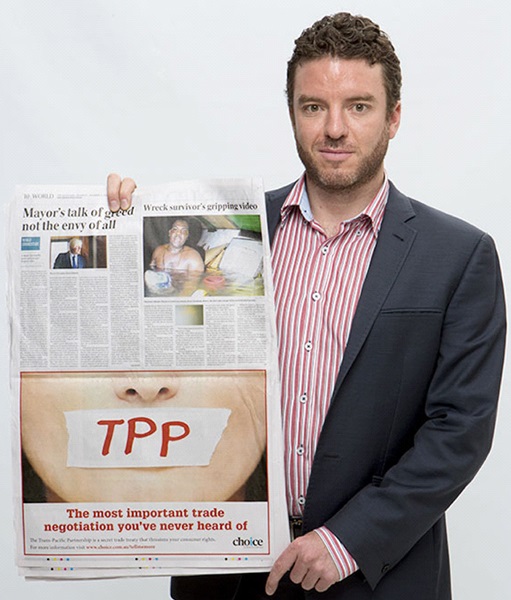
This weekend Trade Minister Andrew Robb will be attending negotiations in Singapore while Australian consumers continue to be shut out. We deserve better.
More than 11,000 consumers have joined together in calling for transparency. Your support has helped us keep up pressure on the Federal Government and spread the word. We will continue to fight for a release of the TPP text before the final agreement.
You can continue to help CHOICE by sharing our petition and talking with your friends, families and networks about the TPP.
Best wishes,
From Nation of Change:
A recently leaked draft of the Trans-Pacific Partnership’s Internet Censorship plan confirmed our worst fears: the TPP is a dream come true for Big Media lobbyists and a nightmare for Internet users.
Despite mounting public opposition, the U.S. officials advancing the controversial censorship proposals aren’t backing down.
We’ve learned that in just a couple of days, at secret closed meetings held in Singapore1, U.S. officials will place intense pressure on the Trade Ministers of the 12 participating countries to adopt their extreme proposals.
Together, we’ve managed to stall the agreement this far, but we need your help to keep going. It takes resources to keep an effective long term, high impact campaign going. Please, can you sign up for a monthly donation to help us stop TPP Internet Censorship?
We have good reason to be hopeful. The recent leak shows that the U.S. is virtually alone in advancing its extreme censorship plans2.
The public pressure you helped to create is starting to get results; TPP talks in both Bali and Japan stalled due to controversial Internet censorship proposals3, and leaders from Malaysia4, New Zealand5, and Chile6 are all calling for greater transparency.
If the lobbyists and the U.S. government succeed, your ISP will have no choice but to begin monitoring your Internet use and removing content.7 It’s just plain wrong. And to add insult to injury, setting up the technology to do this is almost certainly going to make your Internet bill more expensive.8
We can protect the open Internet together, but we have to keep the pressure on. Please, help us to keep fighting by joining our monthly Allies. Your monthly gift empowers our work to keep the Internet open and free of needless censorship. We need you to join now so we can continue.
At OpenMedia, using online grassroots engagement to protect the Internet is what we do. Thanks to supporters like you, our small and dedicated team has won some impressive victories in the past; please, give us the power to do it again by becoming a monthly ally today.
For our future,
Steve, Reilly, and Jason, on behalf of the OpenMedia community.
P.S. Going up against the U.S. government isn’t easy, but our small team knows a thing or two about taking down big opponents. With your support as a monthly ally, we’ll use the power and innovation of the open Internet to win this fight. Please, sign up today.
Footnotes:OpenMedia.org is a non-profit organization that relies on donations from people like you to operate. Our small but dedicated team ensures even the smallest contributions go a long way to make your voice heard. Please donate today. We are an award-winning network of people and organizations working to safeguard the possibilities of the open Internet. We work toward informed and participatory digital policy.
****************************************************************************************

We need House Minority Leader Nancy Pelosi's support to put an end to the President's efforts to Fast Track the Trans-Pacific Partnership into law.
Wikileaks' recent publication of a portion of the TPP has unleashed public opposition to the agreement and sent negotiators scrambling to finalize the deal before it falls apart. The President is now pushing harder than ever to secure Fast Track authority before he signs the agreement in Singapore next week, which would prohibit amendments and limit debate, keeping the bill's controversial contents a secret and greatly increasing the chance it will become law.1
Rep. Pelosi opposed giving Fast Track authority to President Clinton in 1997 and again in 2008 under President Bush, but she has remained silent on granting such authority for TPP thus far.2 Now that she's in a leadership position, Rep. Pelosi's public opposition to Fast Track could unite Democrats to derail it and stop the TPP.
Call Rep. Pelosi’s leadership office, and tell her to make a public stand against giving President Obama authority to Fast Track the TPP into law.
Those negotiating the deal have kept the details of TPP significantly under wraps. But reports indicate this is a corporate giveaway like nothing we've seen before. The result of passing this deal could be devastating: millions of U.S. jobs off-shored, higher medicine prices, environmental regulations trampled and increased exposure to exploitation for international workers.
Internet freedom experts have also characterized parts of TPP as nothing more than a backdoor attempt to pass the most unpopular parts of the Stop Online Piracy Act (SOPA).3 But just as citizen activism derailed that corporate power grab, it can put the brakes on the TPP, too.
If Rep. Pelosi speaks out against Fast Track, she could provide the final burst of energy required to stop the president from railroading TPP through Congress without proper scrutiny and adjustment.
Call Minority Leader Pelosi now and ask her to stand up against Fast Track.
Thank you for all your work on this campaign.
In Solidarity,
From SumOfUs:
Two secret new global pacts -- the TPP and TTIP -- could massively increase the power of corporations to sue our governments when they pass laws to protect our environment or our health.
Governments are meeting right now and could sign up in a matter of days or weeks -- let's speak out now for democracy while we still can!
Tobacco giant Philip Morris is suing Australia for billions of dollars in lost profits because the government took action to reduce teenage smoking. Pharmaceutical giant Eli Lilly is suing Canada for $500 million, just because Canada has laws to keep essential drugs affordable.
Worst of all, these cases are happening in secret international courts to which only corporations have access.
Now, details are leaking of two global trade pacts that would massively expand the power of corporations to sue our governments. Countries from the US to Australia and from the EU to Canada are negotiating right now -- and some could be just days from signing up.
Thousands of corporate lobbyists are helping to write these secret pacts -- but the public isn't allowed to see them. Global governments know that the public won't like these corporate power grabs, so they're hoping to keep them under the radar until it's too late to stop them. But if we can raise our voices now, we can expose these corporate charters and kill the deals forever.
Our governments are meeting right now to lock a deal. Sign the petition to demand they reject any secret treaties that massively increase the power of corporations in our democracies.
The Trans-Pacific Partnership (TPP) and the Transatlantic Trade and Investment Partnership (TTIP) are called trade deals, but both are corporate wish-lists aimed at attacking everything from environmental protections to affordable medicines to internet freedoms. Worst, they give corporations impunity from governments or citizens that want to reign in their power.
In fact, they're probably the most important international treaties you’ve never heard of. The TPP is being negotiated between the United States, Canada, Australia, Japan and other Pacific countries, while the TTIP involves the US and every EU member state -- making these pacts truly global in scope.
There's lots wrong with the these trade deals, but the unaccountable systems they would set up to allow corporations to sue governments are one of the most frightening. If they are signed, future laws designed to protect consumers, our health, and our environment could be overturned in secret courts by corporations that claim the laws harm their profits -- and there is nothing we or our elected governments could do to stop them.
Corporate lobbyists and government insiders are keeping the text of the deals secret because they know that if the full details got out into public view, we wouldn't like what we saw. But we already know enough through leaks to know they are really bad. We can't let them sail through without public scrutiny. If we raise a storm now, we can expose the TPP and TTIP for what they are, and make them politically untouchable.
Demand that our governments reject the TPP and the TTIP -- and stand up for democracy, not more corporate power.
Thanks for all you do,
Paul, Martin, and the rest of us.
********** More Information:How the TPP would impact corporate power: http://act.sumofus.org/go/3023?t=5&akid=3028.871983.RJWIyv SumOfUs is a worldwide movement of people like you, working together to hold corporations accountable for their actions and forge a new, sustainable path for our global economy.
Please help keep SumOfUs strong by chipping in $3.

From Project Censored:
In October 2013, representatives from 12 national governments and about 600 multinational corporations met in Bali, Indonesia for the latest round of negotiations on the Trans Pacific Partnership, a trade agreement that” some observers believe could pull the rug out from under national and local governments trying to regulate the sale and import of GMO foods,” according to James Trimarco.
When asked if the Trans Pacific Partnership (TPP) would outlaw the labeling or banning of GMO foods, Tony Corbo of Food and Water Watch pointed out that because the text is being negotiated in secret, it’s hard to say. Some chapters have been leaked—including 2,376 highly redacted pages obtained as a result of a freedom of information request by Australia’s Pirate Party—but much of the text remains a secret.
A former lobbyist for Monsanto, Islam Siddique, is the chief US negotiator on agriculture. Since the FDA does not recognize GMO foods as any different from non-GMO foods, they do not see a reason that products containing GMO ingredients should be specially labeled.
Commenting on the leaked TPP chapter which details how corporations could seek financial compensation for non-tariff barriers to trade, Arthur Stamoulis of the Citizens Trade Campaign observed, “The Tribunals that adjudicate these cases don’t have the power to literally demand that a government changes its policies, but they can award payments worth millions and even billions of dollars, such that if a country doesn’t want additional cases brought against it, it gets the line.”
Source: James Trimarco, “Will a Secretive International Trade Deal Ban GMO Labeling?”, YES! Magazine, October 18 2013, http://www.yesmagazine.org/planet/will-secretive-international-trade-deal-ban-gmo-labeling-trans-pacific-partnership.
From Huffingtom Post:
By Zach Carter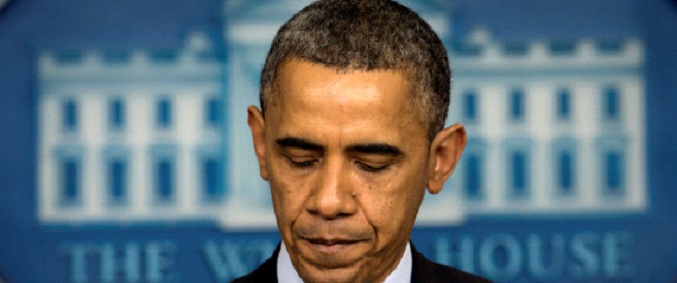
WASHINGTON -- The Obama administration appears to have almost no international support for controversial new trade standards that would grant radical new political powers to corporations, increase the cost of prescription medications and restrict bank regulation, according to two internal memos obtained by The Huffington Post.
The memos, which come from a government involved in the 12-nation Trans-Pacific Partnership free trade negotiations, detail continued disputes in the talks over the deal. The documents reveal broad disagreement over a host of key positions, and general skepticism that an agreement can be reached by year-end. The Obama administration has urged countries to reach a deal by New Year's Day, though there is no technical deadline.
One memo, which was heavily redacted before being provided to HuffPost, was written ahead of a new round of talks in Singapore this week. Read the full text of what HuffPost received here. (Note: Ellipses indicate redacted text. Text in brackets has been added by a third party.) Another document, a chart outlining different country positions on the text, dates from early November, before the round of negotiations in Salt Lake City, Utah. View the chart here. HuffPost was unable to determine which of the 11 non-U.S. nations involved in the talks was responsible for the memo.
"These are not U.S. documents and we have no idea of their authorship or authenticity," a spokesman for the Office of the U.S. Trade Representative said. "Some elements in them are outdated, others totally inaccurate." The spokesman declined to specify which parts were outdated or inaccurate.
The Obama administration has been leading negotiations on the international trade accord since 2010. The countries involved in the talks include Australia, Brunei, Chile, Canada, Japan, Malaysia, Mexico, New Zealand, Peru, Singapore and Vietnam.
One of the most controversial provisions in the talks includes new corporate empowerment language insisted upon by the U.S. government, which would allow foreign companies to challenge laws or regulations in a privately run international court. Under World Trade Organization treaties, this political power to contest government law is reserved for sovereign nations. The U.S. has endorsed some corporate political powers in prior trade agreements, including the North American Free Trade Agreement, but the scope of what laws can be challenged appears to be much broader in TPP negotiations.
"The United States, as in previous rounds, has shown no flexibility on its proposal, being one of the most significant barriers to closing the chapter, since under the concept of Investment Agreement nearly all significant contracts that can be made between a state and a foreign investor are included," the memo reads. "Only the U.S. and Japan support the proposal."
Under NAFTA, companies including Exxon Mobil, Dow Chemical and Eli Lilly have attempted to overrule Canadian regulations on offshore oil drilling, fracking, pesticides, drug patents and other issues. Companies could challenge an even broader array of rules under the TPP language.
New standards concerning access to key medicines appear to be equally problematic for many nations. The Obama administration is insisting on mandating new intellectual property rules in the treaty that would grant pharmaceutical companies long-term monopolies on new medications. As a result, companies can charge high prices without regard to competition from generic providers. The result, public health experts have warned, would be higher prices around the world, and lack of access to life-saving drugs in poor countries. Nearly every intellectual property issue in the November chart is opposed by a broad majority of the 12 nations. The December memo describes 119 "outstanding issues" that remain unresolved between the nations on intellectual property matters. The deal would obligate nations to develop many standards similar to those in the United States, where domestic prescription drug prices are much higher than costs in other nations.
Also according to the December memo, the U.S. has reintroduced a proposal that would hamper government health services from negotiating lower drug prices with pharmaceutical companies. The proposal appears to have been universally rejected earlier in the talks, according to the memo.
Australia and New Zealand have medical boards that allow the government to reject expensive new drugs for the public health system, or negotiate lower prices with drug companies that own patents on them. If a new drug does not offer sufficient benefits over existing generic drugs, the boards can reject spending taxpayer money on the new medicines. They can also refuse to pay high prices for new drugs. The Obama administration has been pushing to ban these activities by national boards, which would lock in big profits for U.S. drug companies. Obamacare sought to mimic the behavior of these boards to lower domestic health care costs by granting new flexibilities to U.S. state agencies for determining drug prices.
The U.S. is also facing major resistance on bank regulation standards. The Obama administration is seeking to curtail the use of "capital controls" by foreign governments. These can include an extremely broad variety of financial tools, from restricting lending in overheated markets to denying mass international outflows of currency during a financial panic. The loss of these tools would dramatically limit the ability of governments to prevent and stem banking crises.
"The positions are still paralyzed," the December memo reads, referring to the Financial Services Chapter. "The United States shows zero flexibility."
Previously leaked TPP documents have sparked alarm among global health experts, Internet freedom activists, environmentalists and organized labor, but are adamantly supported by American corporations and the U.S. Chamber of Commerce. The Obama administration has deemed negotiations to be classified information -- banning members of Congress from discussing the American negotiating position with the press or the public. Congressional staffers have been restricted from viewing the documents.
This story has been updated with a comment from the Office of the U.S. Trade Representative, and to specify that prescription drug flexibilities under Obamacare are provided to state boards.

From Firedoglake:

A new set of documents leaked from the Trans-Pacific Partnership neogtiations reveal an aggressive push by the US government to adopt language that would pose serious danger to workers, citizens, local economies and the environment.1 This newly published section of the TPP empowers multinational corporations to challenge a country's laws and regulations in a privately-run international court. What's worse is that the documents also show the US applying extreme pressure on negotiating partners to surrender their misgivings and acquiesce to this massive power grab before they leave trade talks in Singapore this week.
FDL activists made over 1,000 phone calls to House Minority Leader Nancy Pelosi's office last week asking her to publicly oppose giving President Obama Fast-Track authority to pass the TPP, but we're running out of time. Please call Leader Pelosi to ask her to speak out against Fast Track authority before it's too late.
Call Rep. Pelosi’s leadership office, and tell her to make a public stand against giving President Obama authority to Fast Track the TPP into law.
Thanks for your help. For more information on this campaign see my email about Wikileaks previous TPP disclosure below.
Brian Sonenstein
We need House Minority Leader Nancy Pelosi's support to put an end to the President's efforts to Fast Track the Trans-Pacific Partnership into law.
Wikileaks' recent publication of a portion of the TPP has unleashed public opposition to the agreement and sent negotiators scrambling to finalize the deal before it falls apart. The President is now pushing harder than ever to secure Fast Track authority before he signs the agreement in Singapore next week, which would prohibit amendments and limit debate, keeping the bill's controversial contents a secret and greatly increasing the chance it will become law.1
Rep. Pelosi opposed giving Fast Track authority to President Clinton in 1997 and again in 2008 under President Bush, but she has remained silent on granting such authority for TPP thus far.2 Now that she's in a leadership position, Rep. Pelosi's public opposition to Fast Track could unite Democrats to derail it and stop the TPP.
Call Rep. Pelosi’s leadership office, and tell her to make a public stand against giving President Obama authority to Fast Track the TPP into law.
Those negotiating the deal have kept the details of TPP significantly under wraps. But reports indicate this is a corporate giveaway like nothing we've seen before. The result of passing this deal could be devastating: millions of U.S. jobs off-shored, higher medicine prices, environmental regulations trampled and increased exposure to exploitation for international workers.
Internet freedom experts have also characterized parts of TPP as nothing more than a backdoor attempt to pass the most unpopular parts of the Stop Online Piracy Act (SOPA).3 But just as citizen activism derailed that corporate power grab, it can put the brakes on the TPP, too.
If Rep. Pelosi speaks out against Fast Track, she could provide the final burst of energy required to stop the president from railroading TPP through Congress without proper scrutiny and adjustment.
Call Minority Leader Pelosi now and ask her to stand up against Fast Track.
Thank you for all your work on this campaign.
In Solidarity,
Brian Sonenstein
From Sydney Morning Herald:

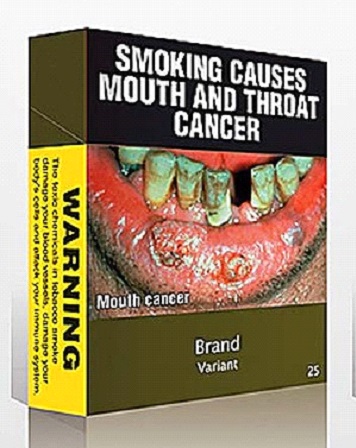
Australia has been accused of failing to defend its historic plain packaging tobacco legislation, with one report from regional talks in Singapore describing Australia as a "constant stumbling block" to other nations' attempts to secure the right to follow suit.
A report from an observer at the Trans-Pacific Partnership talks speaks of efforts to "have language adopted to ensure that any nation that adopts strong tobacco control legislation is not sued or at risk".
"Australia is and has been a constant stumbling block," the memo says. "I totally understand the desire to avoid language that implies that Australia's position under current law is weak or language that implies additional protection is needed," the document says.
"But what I am really trying to understand is . . . Australia's resistance to any language on tobacco, and its seeming lack of interest in working on language that would protect Australia and others from future tobacco trade-based litigation." Australia has required tobacco products to be sold in plain packages since December 2012. Attempts by companies including Philip Morris to overturn the law were defeated in the High Court. But it is now trying to sue Australia in the United Nations Commission on International Trade Law using an investor-state dispute settlement clause in an obscure Australia-Hong Kong agreement.
Most of the 12 nations taking part in the Trans-Pacific Partnership talks want to protect their rights to enact similar legislation in the face of a US insistence that the agreement include clauses allowing private corporations to sue governments.
"I never thought Australia would be a major problem in this effort, but we repeatedly hear that it is," the email says. Australia's Trade Minister, Andrew Robb, has indicated he is prepared to trade Australia's previous opposition to investor state dispute settlement clauses in exchange for greater access to markets for commodities such as sugar.
Mr Robb told Parliament that ''substantial progress'' had been made in the talks and said that his aim was to ''advance our national interest, not to compromise it''.
An Australia Institute survey released on Friday finds only 11 per cent of Australians "definitely know" about the Trans-Pacific Partnership negotiations. Almost 90 per cent think the details of such deals should be made public before they are signed.
Told that the US wants the right for its corporations to sue governments, 75 per cent are opposed. Asked if they trust the Australian government when it says it will not sign an agreement that will push up the price of prescription drugs, 67 per cent say no.
On Thursday Labor and the Greens united in the Senate to pass a motion expressing alarm at the potential impact of the deal on pharmaceutical prices.

From newmatilda:
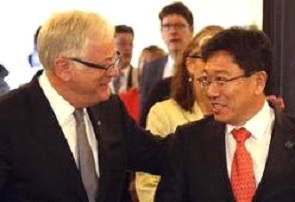
Openness in negotiation is a key component of democratic politics. Without it, the public can't make sound decisions. Luke Bacon on the anti-democratic nature of the Trans-Pacific Partnership
As governments and corporations push to finalise negotiations for the Trans-Pacific Partnership agreement (TPP), people who support wide participation in policy development should increase the pressure for open discussion.
Relegating the TPP to a "special interest" issue for online activists is a success for secrecy. Opposition to the TPP is actually in the broader interest of individuals and organisations working in health, education, human rights, journalism, ecology, welfare, workers rights and other related areas.
Its stated goals are “economic integration” and increasing “market access” but the TPP deal covers far more than trade. There are sections on labour, the environment, e-commerce, intellectual property, foreign investment, financial services, telecommunications, Investor State Dispute Settlement and more. The treaty prescribes how member states will legislate in these areas.
Negotiations started in 2010 and there is pressure to finalise the text as soon as possible. The 2013 deadline was missed this week and negotiations have been extended into January.
Only a handful of representatives from each member state are allowed access to the negotiation text. No one else, not even elected representatives outside of the negotiation team, are allowed to know what’s on the table. The negotiations themselves are “off the record”, though roughly 700 lobbyists ("advisors"), mostly representing corporate interests, do have access.
Hundreds of thousands of people around the world have spoken out demanding public scrutiny of public policy, signing petitions and attending protests.
Last week, Greens Senator Peter Whish-Wilson successfully passed a motion requesting the final treaty text be made available to the public “well before it is signed.” Since then, the Senate's request has been refused by the Coalition who say its release would "damage Australia's standing".
Nobel laureate economist Joseph Stiglitz made a damning assessment of secrecy in democracies for his 1999 Oxford Amnesty Lecture:
"Meaningful participation in democratic processes requires informed participants. Secrecy reduces the information available to the citizenry, hobbling their ability to participate meaningfully… voters have to be informed: they have to know what alternative actions were available, and what the results might have been."
As far as the TPP is concerned, US trade representative Ron Kirk says secrecy from the public is needed to “preserve negotiating strength and to encourage our partners to be willing to put issues on the table they may not otherwise”.
Stiglitz addresses this position:
"The argument that public discussions — including discussions of uncertainties and mistakes — will undermine the authority of public institutions is one of the most corrosive of democratic processes. It is akin to the kinds of arguments that authoritarian regimes conventionally use. I would argue, on the contrary, that were governments to deal honestly with their citizenry, confidence in government and public institutions would increase, not decrease."
Unfortunately, in our society, arguments for secrecy are commonplace. Immigration and asylum seeker policy, locked down under Operation Sovereign Borders, is just the most recent example of a situation where basic information must be smuggled out, so the public can see the detail of policies enacted on their behalf.
Another common defence of the TPP’s secrecy is that "this is just the usual process for trade agreements" and that negotiators are conducting private consultations, in which affected stakeholders (public interest advocates in addition to the lobbyists) can voice concerns.
Instead, as Stiglitz says, the real effect is that "the quality of decision making is thereby weakened… With more mistakes, public officials become more defensive; to protect themselves, they seek even more secrecy, narrowing in the circle still further, eroding still further the quality of decision-making."
Public Health Lecturer Deborah Gleeson points out that, “since those being consulted don’t have much information about what’s in the agreement and aren’t permitted to view the text, meaningful input is difficult. Indeed, it’s farcical to be consulted about the details of text you haven’t seen!”
On 6 December Stiglitz published an open letter to TPP negotiators criticising the secretive nature of the negotiations, he warned that "The TPP proposes to freeze into a binding trade agreement many of the worst features of the worst laws in the TPP countries, making needed reforms extremely difficult if not impossible."
On 13 November Wikileaks published the Intellectual Property (Rights) Chapter of the agreement, this is the secret draft negotiation text with annotations for the positions of nations on individual clauses. For the first time, we can see what is on the table and the stance our representatives are taking.
The leaked negotiation text includes clauses to expand the scope of patents to cover medical procedures, force your ISP to police your internet usage, and increase opportunities for multi-nationals to sue governments through investor-state dispute settlements. This is just the intellectual property chapter — the rest of the agreement remains in the dark.
Since the leak, Australia’s Trade Minister Andrew Robb has said “the Government will not permit any outcome in its trade negotiations which undermines the Pharmaceutical Benefits Scheme or Australia's health system more generally.” However, regardless of Robb’s claims, Australia will be held to the ratified text of the TPP and in its current form it would raise the price of medicine by slowing the process to generic manufacturing.
In these negotiations — where the biggest economy in the world is playing hard-ball —how does it help our bargaining power for all negotiations to be secret? If you were really concerned with the public interest, wouldn’t you want the public there to back you up?
It proves the vital relevance of people like Chelsea Manning, Edward Snowden and Jeremy Hammond, and of Wikileaks, that the only way we could discover the deals being made on our behalf is by concerned people on the inside passing us information.
Many are already speaking out against the contempt for participatory democracy visible in the TPP negotiations. Doctors Without Borders have long recognised the effect the TPP will have on the lives of people they work with. A new website has launched with suggestions for what you can do.
Everybody has a role in opposing this attack on the public interest — even something small broadens the group involved. Support whistleblowers who risk everything so that we can know what’s going on; demand a say in the direction our laws drive us. Already the public outcry has prompted someone brave on the inside to pass out the crucial draft chapter.

From CHOICE :
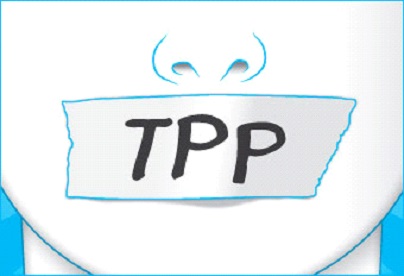
A journalist has been uninvited from a Department of Foreign Affairs and Trade (DFAT) briefing on the Trans-Pacific Partnership (TPP) Agreement negotiations, despite the fact that the invitation (which has since been taken down from the DFAT website, although CHOICE has kept a copy) stated that it was open to “members of the public, and business and civil society stakeholders”, and made no mention of a ban on journalists attending.
Earlier today, CHOICE learned that journalist Josh Taylor of ZDNet was told not to attend the event, despite having received a confirmation of his RSVP earlier in the week. According to Taylor, he received an email on Tuesday, which said that TPP briefings are "off the record" and therefore members of the media are not "eligible" to attend. After a social media backlash, DFAT reportedly told Taylor he could attend the briefing in a "private capacity", meaning he cannot record or attribute any of the briefing material.
The briefing, which will be held this afternoon on 30 October at the NSW DFAT State Office and will be attended by CHOICE, will provide an update on the TPP negotiations and an opportunity for further stakeholder input.
CHOICE is currently campaigning against the secrecy that has surrounded the contents of the TPP. We’re calling on the federal government to release the details of what's in the TPP.
Sign our petition calling on the government to bring consumers to the table and release the text before the TPP is signed.

Are you concerned about increasing cost of medicines? Would you worry if Australians could be jailed for illegally downloading an episode of Game of Thrones? Do you want to know if your muesli bar contains palm oil?
Then you really should care about the Trans-Pacific Partnership (TPP), a trade agreement being negotiated in secret between Australia, Brunei, Chile, Canada, Japan, Malaysia, Mexico, New Zealand, Peru, Singapore, the United States and Vietnam. In this report you will find information on:
• The secrecy surrounding the TPP and details of how the media is being locked out of briefingsCHOICE is calling for the TPP text to be released before a final agreement is signed.
Video: TPP
Why haven’t you heard more about it?
The TPP has been shrouded in secrecy, with negotiations happening behind closed doors and non-disclosure agreements securing the negotiators’ silence. And while CHOICE has met with several of those involved in drafting the agreement and even attended meetings with negotiators at a round of negotiations held in Malaysia earlier this year (we were permitted to have our say, but could only guess at the contents of the agreement in order to raise our objections), we still don’t know what the final agreement will contain. Because of the secrecy, which began under the previous Labor government and has continued after the September election of the Coalition, any public knowledge about the TPP is based on leaked drafts and statements made by those involved.
The kicker? Hundreds of “cleared advisors” - a group comprising industry lobbyists from the US - have had access to the full drafts of the TPP, while public interest groups like CHOICE have been kept in the dark.
WikiLeaks published a draft overnight of the intellectual property chapter of the agreement, which they say was distributed among the chief negotiators of the TPP in late August this year. While the final chapter will likely be different as talks are ongoing (two rounds of talks have already been held after the leaked chapter was authored), the draft includes details on the positions taken by the countries on various measures. This leaked draft indicates that consumer rights could be significantly eroded if Australia signs and ratifies the TPP.
“Australian consumers have been betrayed,” says Dr Matthew Rimmer, Associate Professor at the ANU College of Law. “The intellectual property chapter of the Trans-Pacific Partnership is a monster. The proposals in respect of copyright law, trademark law, patent law, and data protection would hit Australian consumers hard.
“The Trans-Pacific Partnership undermines Australian efforts to take substantive policy action in respect of IT pricing. The agreement does nothing to further efforts to reform copyright exceptions in Australia. The agreement threatens consumer rights, privacy, and internet freedom.”
The Australian government seems like it isn’t too keen on TPP negotiations hitting the headlines. In late October 2013, technology journalist Josh Taylor of ZDNet told CHOICE he was barred from attending a Department of Foreign Affairs and Trade (DFAT) briefing on the TPP negotiations, despite the fact that his RSVP had previously been confirmed.
According to the invitation, the briefing was open to “members of the public, and business and civil society stakeholders”; no mention was made of journalists being excluded. But in revoking his invitation, Taylor says DFAT told him that TPP briefings are “off the record”. In a backflip, DFAT later reportedly told the journalist he could attend in a private capacity, but couldn’t record or attribute any of the briefing material.
02.Public interest issuesThe leaked chapters of the TPP indicate that the agreement may contain an investor-state dispute settlement (ISDS) clause, which allows foreign corporations to sue Australia’s government for loss of future profits. While the previous government said that an ISDS provision would be a deal-breaker for Australia, the Coalition has previously indicated that it may consider signing the TPP with an ISDS clause (though there are indications that there may be a change in their position).
Similar agreements have already had a significant impact in Australia.
After the introduction of tobacco plain-packaging rules in Australia, cigarette companies (unsuccessfully) challenged the new laws twice in the High Court. Philip Morris Asia (which acquired Philip Morris Australia after the introduction of the plain-packaging legislation) is challenging plain packaging again - this time under international law, by invoking a 1993 free trade agreement that included ISDS provisions between Australia and Hong Kong.
The private arbitration is being conducted under the United Nations Commission on International Trade Law, and despite our highest court ruling in favour of the legislation, the Australian government has allegedly already spent millions of dollars in mounting a defence to the challenge.
Other examples abound. The US-based oil and gas company Lone Pine Resources sued the Canadian government for $250m in lost profits after Quebec placed a moratorium on fracking - a controversial drilling technique for releasing oil and natural gas from underground shale rock formations - while it studies fracking’s environmental impact.
Mexico’s attempts to limit the importation of high fructose corn syrup were also struck down by the ISDS provision in the North American Free Trade Agreement, with a panel awarding the US-based food producer Cargill more than $77m in damages, plus interest and costs. After interest, Mexico reportedly now owes Cargill close to $100m.
So just how much worse could things get with a TPP that allows foreign companies to sue our government?
A leading Malaysian trade official has reportedly said that the “elimination of the trade barriers such as rules and labelling laws” will be a priority in the TPP negotiations, including those for palm oil.
CHOICE has been campaigning for the labelling of palm oil - which is much higher in saturated fats than other oils and is responsible for widespread deforestation due to unsustainable production - for some time now. And we’re concerned that the TPP could spell the end of palm oil labelling before it has even begun.
CHOICE Lead Campaigner Angela Cartwright says palm oil could just be the beginning. “We have fought to get to where we are on food labelling, but the TPP could mean a big step backwards. For example, with potential rules that protect proprietary formulas from being disclosed, even something like the percentage of ingredients on the back of food products could be in jeopardy,” she says.
03.CopyrightAssociate Professor Kimberlee Weatherall of the Faculty of Law at Sydney University says the WikiLeaks draft of the IP chapter of the TPP “would lock in provisions that have been repeatedly criticised by Australian politicians, including most recently in the Joint IT Pricing Inquiry”.
She says: “The US push for endless criminalisation of even private activities (partially supported, I am afraid, by Australia) is frankly horrifying. Although the Australian negotiators do not support every last detail of the US proposals they are signing up to far more than they should and will, if they sign, lock Australia into a new, complex, and damaging set of IP obligations that will be giving users, IP owners, and policymakers headaches for many years to come.”
The leaked draft of the intellectual property chapter of the TPP indicates that US-style copyright laws could be adopted by all TPP members. Australia is among the minority of countries pushing for the criminalisation of copyright infringement that has no direct or indirect motivation of financial gain. And if the US has its way, downloading an episode of Game of Thrones from BitTorrent could lead to criminal penalties. The good news is the Australian government is opposing this measure.
The US is fighting for a ban on parallel imports without the permission of the copyright holder, which would mean Australians could not buy products cheaply overseas and ship them here unless a company says they can (Australia and several other countries are opposing the ban).
The TPP may also lead to greater protection for companies using geo-blocking on movies, music, books and software, and could lead to enforcement provisions against those who seek to get around these blocks.
And the leaks indicate that parties to the TPP may enact laws that force an internet service provider to give out “information in [their] possession” about their customers to copyright owners if there is just a “claimed” infringement, without requiring evidence or probable cause. That means if a Hollywood studio asked your ISP for details such as your name and address because they suspected (without necessarily having evidence) that you’d downloaded a movie illegally, your ISP may have to provide it to them.
The TPP may also extend the life of pharmaceutical patents and allow companies to get new patents on existing drugs by making small changes to their formulation, such as changing the dosage, or even changing from a tablet to a capsule. This could mean cheaper generic versions of medications take a lot longer to reach the market, costing Australian consumers and taxpayers buckets of cash in the long run. Dr Rimmer says: “The Trans-Pacific Partnership promotes the evergreening of pharmaceutical drugs. One would expect higher drug prices.”
The impact of the TPP on prices and availability of medication is so great, in fact, that Médecins Sans Frontières (MSF) (also known as Doctors Without Borders) have taken the unprecedented step of campaigning against it.
"The TPP currently includes some of the harshest provisions against access to medicines ever included in a trade agreement with developing countries, gutting public health safeguards and leaving them unable to take the steps needed to protect the lives and health of their people above the profit of multinational pharmaceutical companies," says a spokesperson.
MSF’s Advocacy and Public Affairs Manager Jon Edwards says the TPP threatens HIV/AIDS treatment in sub-Saharan Africa and beyond, and could potentially delay the availability of more effective treatments.
“It seems to us that the TPP is protecting [pharmaceutical] monopolies. MSF is for competition when that competition delivers affordable medicine,” he says.
Australia’s position on medication is one of the few areas where we stand opposed to the US, according to the WikiLeaks draft of the IP chapter.
If the US has its way, “diagnostic, therapeutic, and surgical methods for the treatment of humans or animals” would be eligible for patents. This could mean that hospitals performing surgery using a new, less invasive method, for example, would be forced to pay royalties. This could significantly delay the introduction of improved treatments, and is likely to make the methods expensive to train in and perform.
The US also wants to “make patents available for inventions for the following: plants and animals”.
04.What CHOICE wantsAt a meeting with DFAT in late October 2013 (the same briefing from which other media organisations were uninvited due to DFAT’s claim that journalists were “ineligible” to attend TPP briefings), DFAT told CHOICE that the IP chapter of the TPP was still being drafted. They told us that Australia would oppose any agreement that sought to extend IP measures beyond our “domestic settings” - bureaucrat-speak which, CHOICE assumes, means our current laws. They also said they would oppose restrictions on parallel imports. But the WikiLeaks draft indicates that this may not be the case.
CHOICE believes public interest advocacy groups should have input into such a wide-reaching agreement. We want an open and honest debate with the government and other stakeholders on what should and should not be included in the TPP trade negotiations. Unfortunately, we have to rely on leaked texts and hearsay instead.
It is not too late to release the drafts of the agreement so that they can be debated in civil society and so the TPP can be made fairer for consumers.
The leak of the IP chapter of the TPP by WikiLeaks indicates that there are many sections of the TPP upon which the 12 parties don’t agree, so the agreement is not finalised.
CHOICE is currently campaigning against the secrecy surrounding the TPP. We’ve launched a petition calling on the government to release the contents of the TPP, and we believe such an important and binding trade agreement must be open for public scrutiny and oversight. Please sign our petition and send our government the message that Australian consumers deserve to have a say on the TPP.

From Organic Consumers Association:
For related articles and more information, please visit OCA's Politics and Democracy page.
In his epic book of poetry, Leaves of Grass, Walt Whitman advises “Resist Much. Obey Little.” But when it comes to corporations trampling on local rights, the city of Madison, Wis., advises other cities and counties to do what it has done: Resist much. Obey not.
In October, the Madison City Council unanimously passed a resolution declaring the city a “TPP-Free Zone,” and promising that if Congress passes the Trans Pacific Partnership, a global trade agreement, “We will not obey” it.
The TPP is the largest global trade pact to be negotiated since the World Trade Organization (WTO). Most of the details of the deal remain a mystery. Negotiations are being conducted in secret. But we know, from some of the drafts that have been leaked, that the TPP would hand transnational corporations the power to “protect their future profit potential” by suing countries, states, counties or cities in order to wipe out existing laws—laws specifically designed to protect communities’ best interests.
Those interests could include everything from internet freedom and banking and finance regulation, to the passing of bans on growing genetically modified organisms (GMOs).
“Call it a sovereignty issue, or local control, or threat of lowering local standards with regard to government procurement (elimination of any “buy local” ordinances), food safety ordinances, living wage ordinances, environmental requirements, prevailing wage requirements on construction, etc.—[Madison City Council members] saw all these as threats to their authority and the job they had been elected to do,” said David Newby of the Wisconsin Fair Trade Coalition. Newby played a key role in passing the “TPP-Free Zone” resolution in Madison, and another in Dane County, Wis.
The “TPP-Free Zone” concept is modeled after the successful grassroots strategy that helped defeat a similar trade agreement in 1998, called the Multilateral Agreement on Investment (MAI). The basic premise was to convince elected officials, city by city, county by county, of the need to refuse to obey the MAI if it became law. The anti-MAI grassroots effort succeeded by exposing the dark side of the MAI, and by proving its unpopularity with the public.
Growing oppositionA scenario similar to the anti-MAI grassroots movement is unfolding today, this time with the TPP as its target. According to the latest poll, 61 percent of the public in key countries, including the U.S., oppose the TPP. Opposition has grown, thanks to the work of many groups, including the Organic Consumers Association, who have publicly opposed the deal, and launched massive public education campaigns to expose the unprecedented secrecy surrounding the deal, and the potential for the TPP to subvert democracy for the benefit of corporate profits.
TPP protesters recently turned out in mass in Salt Lake City and Los Angeles. More than 400 organizations representing 15 million Americans have already petitioned Congress to do away with Fast Track, a tactic the Obama Administration wants to use in order to ram the deal through Congress, without debate.
But if efforts to thwart the deal fail, states, cities and counties can follow the lead of Madison and Dane County by passing their own TPP-Free zones. Ruth Caplan, with the Alliance for Democracy, hopes they will. In a recent interview, Caplan urged people to work with their local governments to “build a democratic movement of resistance.”
“This starts from the grass roots, in the communities where we live . . . This is not, 'Please, Congress, do the right thing,' but language of resistance. We need to say, 'If you create this secretly negotiated corporate trade agreement and it is rubber-stamped by Congress, we will not obey.'"
The Berkeley Peace & Justice Commission (PJC) has approved a TPP-Free Zone resolution, and says the Berkeley, Calif. city council could take it up this month.
For citizens or officials interested in passing TPP-Free Zone resolutions in other states and counties, the Alliance for Democracy website provides information, model municipal laws that can be edited to fit the needs of any community, and includes pointers on how to convince wavering local officials to pass “We Will Not Obey” resolutions.
The TPP, Monsanto and the future of foodThere’s a long list of reasons to oppose the TPP. Food safety is right at the top—especially with a former Monsanto lobbyist leading U.S. negotiations on agricultural issues.
Specifically, the TPP would require countries to accept food that meets only the lowest safety standards of the collective participants. That means consumers could soon be eating imported seafood, beef or chicken products that don’t meet even basic U.S. food safety standards. And the (FDA) would be powerless to shut down imports of these unsafe food or food ingredients.
Countries, including those in the European Union, could also find it increasingly difficult to ban, or even require the labeling of, genetically modified organisms (GMOs) if biotech companies determine that those countries’ strict policies restrict fair trade and infringe on the companies’ “rights” to profit.
To top it off, corporations would be allowed to resolve trade disputes in special international tribunals, effectively wiping out hundreds of domestic and international food sovereignty laws. Products labeled fair trade, organic, country-of-origin, animal-welfare approved, or GMO-free, could all be challenged as “barriers to trade.”
With the world’s food supply, and consumers’ health, already endangered by chemical-intensive industrial agriculture and climate change, the U.S. and other governments should be looking for ways to promote sustainable food and agriculture policies, not restrict governments’ abilities to do so. Instead, the Obama Administration is subverting the principles of democracy in favor of handing a few transnational corporations unprecedented power to put profits above the health and well-being of consumers.
Fortunately citizens are protesting. And city and county governments are claiming the power to resist.
Zack Kaldveer is assistant media director of the Organic Consumers Association.
from Huffington Post:

Since 2010, the United States has been negotiating a secret trade deal, the Trans Pacific Partnership. If approved by Congress, this pact between the U.S. and 11 or 12 of America's Pacific Rim trade-partners would govern 40 percent of U.S. imports and exports. So far, the negotiations are being conducted under tight security; for good reason, as there are big problems with TPP.
1. U.S. trade negotiators want TPP to get special, "fast-track" treatment from Congress.
While Congress has the legal duty to oversee trade agreements, in the past it has given up some of that responsibility to the president. Under a fast-track arrangement, trade agreements such as TPP, would simply get an up or down vote without Congress delving into the details. The previous fast-track authorization lapsed in 2007 and now the Obama administration wants Congress to restore it so that TPP will be approved with a minimum of fuss.
Interestingly, most Republicans are willing to give "fast-track" trade authority to President Obama even though they don't trust him on other issues. That's because powerful transnational corporations want the Trans-Pacific Partnership to be approved. The U.S. Chamber of Commerce stated, "Completing the TPP would pay huge dividends for the United States.
The agreement would significantly improve U.S. companies' access to the Asia-Pacific region, which is projected to import nearly $10 trillion worth of goods in 2020."
2. TPP doesn't include China.The TPP partners are Australia, Brunei, Chile, Japan, Malaysia, Mexico, New Zealand, Canada, Peru, Singapore, Vietnam, and potentially Korea. But the Economic Policy Institute reported that since 2001, "the U.S. has lost 2.7 million jobs... due to growing trade deficits with China." The American Manufacturing website noted that approximately 40 percent of the US trade deficit is due to China, which "maintains numerous policies, including state-sponsored subsidies... [that] have a direct role in increasing the US-China trade imbalance."
Recently, United Steelworkers president Leo Gerard observed that a key problem with TPP is the definition of "domestic product:" "We're supposed to compete with countries that are getting their parts from China... and exporting materials to here, when if they have 35 percent of material from their country they're called 'a domestic product'." In other words, a country such as Vietnam could get the majority of their material from China, assemble it in Hanoi, and then ship it to the US as as a "domestic product" -- even when most of the content came from China.
3. Free-trade agreements, such as TPP, haven't protected U.S. jobs.Public Citizen reported that since 1994, "the [freed-trade agreement] deficit surge implies the loss of nearly one million American jobs." Public Citizen said wherever there were free-trade agreements US trade deficits increased and in the countries not covered by free-trade agreements our deficits decreased.
Recently, Campaign for America's Future revisited the US trade agreement with Mexico -- NAFTA:
In 1993, the broadest assurance by those selling this model - including almost all Republicans and President Clinton - was that it would create U.S. jobs by expanding the trade surplus the U.S. then enjoyed with Mexico... Now the U.S. suffers chronic $60 billion-$70 billion annual trade deficits with Mexico and by this summer the accumulated U.S. current account losses with Mexico under NAFTA will pass $1 trillion.
The Economic Policy Institute says the US lost an estimated 700,000 jobs due to NAFTA.
4. If TPP were to be approved, most of the benefit would go to corporations and the rich.Public Citizen reported, "the TPP would mean wage losses for all but the richest 10% of U.S. workers."
5. There are a wide variety of serious issues that need to be discussed by Congress and the American public.For example, the Washington Post reported:
The United States is proposing a number of provisions designed to strengthen and extend brand-name pharmaceutical companies' monopoly privileges. For example, several provisions would support the pharmaceutical firms' practice of "ever-greening" in which a firm will hold a patent on drug 'x' in tablet form, then later obtain a patent on drug 'x' in a gel cap, and later still obtain another patent on the same drug in capsule form. This extends patent life on a known substance, despite no new medical efficacy; thus it delays generic competition.
As another example,
[TPP] includes provisions similar to those of the failed Stop Online Piracy Act (SOPA), and Protect Intellectual Property Act (PIPA), and the Anti-Counterfeiting Trade Agreement (ACTA) that the European Parliament ultimately rejected. The United States appears to be using the non-transparent Trans-Pacific Partnership negotiations as a deliberate end run around Congress on intellectual property, to achieve a presumably unpopular set of policy goals.
The obvious first step is to ask Congress to deny the White House fast-track authority so that the Trans Pacific Partnership can be fully vetted and the public made aware of all the details of the labyrinthian agreement.

from Project Censored:
On November 13, 2013, Wikileaks published a section of a trade agreement called the Trans-Pacific Partnership Treaty, or TPP. On the surface, the treaty is meant to facilitate trade between the twelve potential member countries: Australia, Brunei, Canada, Chile, Japan, Malaysia, Mexico, New Zealand, Peru, Singapore, United States, and Vietnam. However, there are a number of red flags surrounding the agreement.
Eight hundred million people, and one-third of all world trade, stand to be affected by this treaty, and yet, only three people from each member nation have access to the entire document. Meanwhile, 600 “corporate advisers,” representing big oil, pharmaceutical, and entertainment companies, are involved in the writing and negotiations of the treaty.
The influence of these companies is clear, as large sections of the proposal involve corporate law and intellectual property rights, rather than free trade. Corporations could gain the ability to sue governments not only for loss, but prospective loss. At the same time, patents and copyrights would see more protection. This means longer patents, leading to less access to generic drugs, and a lockdown on Internet content.
Though the Wikileaks exposure was followed quickly by an anti-TPP push in Congress, what is perhaps the most disconcerting is lack of coverage in corporate U.S. media. Japan, Australia, and even Russian media discuss the TPP openly, while American news sources remain silent even as the Obama administration attempts to fast-track it through Congress.
Sources:
from Popular Resistance:
An important task of the movement is to expose the difference between ‘official policies’ and ‘actual policies.’ That is, what the power holders say they are doing and what the policies actually do, which are often the complete opposite. Every government policy put forward by either of the two corporate-funded parties is designed to help their funders, not the people.
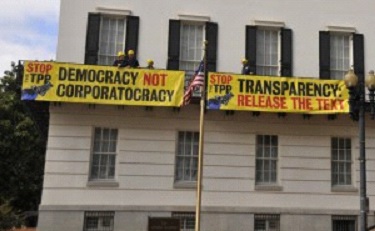
We are going to be seeing myth in hyper-gear in January around the Trans-Pacific Partnership (TPP). The government has worked hard, with the cooperation of the mass media, to keep the TPP secret from the public. But, now most people in the activist community are aware of the TPP thanks to high profile protests and leaks of portions of the TPP that reveal the US is pushing an extreme corporate power grab. And more people are aware that the President is trying to circumvent a democratic process of review in Congress.
In early January some of the most pro-corporate members of Congress will put forward a bill calling for Fast Track Trade Promotion Authority. We expect to hear President Obama and corrupt senators like Max Baucus (D-MT) and members of Congress like David Camp (R-MI) telling us that these rigged trade agreements are necessary for the economy. We just passed the 20 year anniversary of NAFTA, on which the current trade negotiations are based, and the opposite has happened. We need to explode the myth. These trade agreements are not to create jobs or raise wages or even grow the US economy, they are to make transnational corporations wealthier and increase the profits of the investor class. They are only good for the wealthiest and are terrible for the rest of us, as a recent report found:
“A new Public Citizen report shows that not only did promises made by proponents [of NAFTA] not materialize, but many results are exactly the opposite. Such outcomes include a staggering $181 billion U.S. trade deficit with NAFTA partners Mexico and Canada, one million net U.S. jobs lost because of NAFTA, a doubling of immigration from Mexico, larger agricultural trade deficits with Mexico and Canada, and more than $360 million paid to corporations after “investor-state” tribunal attacks on, and rollbacks of, domestic public interest policies.”
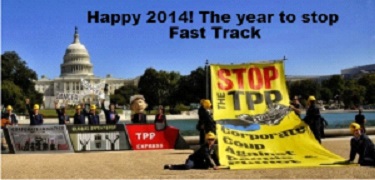
Stopping the TPP will be job one for the movement in 2014. January will be the key month to engage in this issue because a vote on Fast Track is expected by the end of the month. The TPP is an issue that unites the movement because it affects not just workers but the environment, regulation of finance, Internet freedom, food safety, healthcare and gives corporations control of virtually every aspect of our lives. There are many ways to organize in local communities to unite people and stop the TPP. We can stop the TPP and when we do, it will be a major victory of the people over the transnational corporations and their government allies.

From Nation of Change:
If there is any negative image of what Democracy looks like, any way to define a thing by its opposite, it is the Trans Pacific Partnership.
Last week, legislation to fast track a vote on the Trans Pacific Partnership was introduced in Congress.
President Obama, who, along with advisors from several hundred corporations, has built the TPP in secret, away from the prying eyes of Congress or the public, desperately wants this fast track authority. The grant of that authority is, according to prevailing wisdom and the pro-neoliberal agenda Forbes magazine contributor Dan Ikenson describes as something being “widely considered necessary to complete and ratify the Trans-Pacific Partnership agreement between the United States and 11 other Pacific-bordering nations, as well as other prospective trade agreements."
Why is Fast track so important?Because President Obama, and the corporate advisors he so willingly serves, knows full well that if there were a public debate on the TPP, not only would it never pass, but people would take to the streets in a 1999 Battle in Seattle WTO protests kind of way.
The TPP is a Trojan horse that seeks to usher in a backroom secret sweetheart deal for the global elite. Fast track avoids public debate- and would ask for an up or down yes vote from members of congress who have not yet read the agreement. Neither have you. Some of you have read sections of the TPP, as published by WikiLeaks as we reported on this program last November:
“Today, WikiLeaks released the secret negotiated draft text for the entire Trans-Pacific Partnership Intellectual Property rights chapter. According to the WikiLeaks press release :“The WikiLeaks release of the text comes ahead of the decisive TPP Chief Negotiators summit in Salt Lake City, Utah, on 19-24 November 2013. The chapter published by WikiLeaks is perhaps the most controversial chapter of the TPP due to its wide-ranging effects on medicines, publishers, internet services, civil liberties and biological patents.”
This is a major leak because this top-secret trade deal that is, in fact, much more than a trade deal. Remember NATFTA? Remember the concept of Corporate Personhood from the Citizens United case? The TPP combines all of the worst elements of NAFTA and Citizens United, shoots them up with steroids, sprinkles in a speedball and codifies these principles into a trade agreement that is in fact much more than a trade agreement. We will have more on that in a moment, but first to sum up what we do know already, based on previous leaks of the working text about how the TPP would eclipse the concept of corporate personhood, I’ll quote David Swanson of Roots Action, who writes that the TPP would make popular the phrase Corporate Nationhood:“Many of us have heard of corporate personhood. Corporations have been given the Constitutional rights of persons by U.S. courts over the past 40 years, including the right to spend money on elections. By corporate nationhood I mean the bestowing of the rights of nations on corporations (…) Treaties, according to Article VI of the U.S. Constitution, are -- together with the Constitution itself -- the supreme law of the land. So U.S. laws would have to be made to comply with the TPP's rules.”How would U.S. laws be made to comply? Because, As Kevin Zeese and Margret Flowers write: “In addition to requiring that laws conform to provisions within the TPP, corporations would be allowed to sue governments in the trade tribunal if laws interfere with their profits. Governments could not represent their interests before the tribunal or appeal adverse decisions. This would be a tremendous loss of sovereignty.”And who is on this tribunal? Three judges, appointed by the corporations
So, if you think the concept of a Representative form of government of the people by the people and for the people is a farce in the age of corporate personhood and the wealth divide that has hijacked the principles of big D Democracy upon which this country is supposed to operate is a farce now, imagine a world where food safety, the environment, workers rights, and access to health care are further hijacked by corporate power. That world is one in which a total corporate coup ushered in by President Obama- in service to the 600 corporations who have advisors with access to drafts of the TPP puts the neoliberal boot to the neck of you, me and just about everyone we know. As Noam Chomsky describes the neoliberal monster, it is built "to maximize profit and domination, and to set the working people in the world in competition with one another so as to lower wages to increase insecurity.”
You have all heard the demand, belted out in unison by those who yearn to be heard, to "Show me what Democracy looks like”!If there is any negative image of what Democracy looks like, any way to define a thing by its opposite, it is the Trans Pacific Partnership.
ABOUT DENNIS TRAINOR, JR.Dennis Trainor, Jr. (writer & host of Acronym TV) is also the director of the Occupy Wall St. documentary, American Autumn: an Occudoc. Acronym TV is an independent news program with over 21 thousand subscribers and 31 million video views and counting.

From Popular Resistance Newsletter:
The White House is calling January “TPA (Trade Promotion Authority) Month” and has made it their task to pass Fast Track. President Obama needs Fast Track to pass the Trans-Pacific Partnership (TPP). When Congress returned this month, a bill was quickly introduced after delays of more than a year.
The lies begin with title of the bill: “The Bipartisan Congressional Trade Priorities Act of 2014.” Bi-partisan? In the House there was only one sponsor, Republican David Camp (MI). The Republicans demanded the Democrats add a sponsor before it was introduced, but due to public pressure, they could not find one.
The only Democrat on the bill in the Senate is Max Baucus (MT) — the senator who gave us the Bush tax cuts for the wealthy and who is leaving the senate to become Ambassador to China. So, the bill is only bi-partisan until he heads off to his new job.
Baucus likes to informally call the bill “The Job Creating Bipartisan Trade Priorities Act,” but that just adds another lie since trade agreements consistently lose jobs, expand the wealth divide and increase trade deficits.
TPP Loses MomentumAfter four years of secret negotiations with more than 600 corporate advisers, the once seemingly invincible largest trade bill in history, covering 40% of the world’s economy , looks very much like it can be defeated. Why is the TPP looking like it can be stopped? One reason is its secrecy.
Leaks are sinking the TPP like the Titanic on its way to the bottom of the ocean. Ron Kirk, the former US Trade Rep said they were keeping it secret because the more people knew, the less they would like the TPP and it would become so unpopular it could never become law.
Each leak has proven him right.
This week, Wikileaks released the Environmental Chapter. The bottom line – there is no enforcement to protect the environment. The TPP is worse than President George W. Bush’s trade deals. Environmental groups are saying the TPP is unacceptable.
Similarly, the leak of the Intellectual Property Chapter revealed that it created a path to patent everything imaginable, including plants and animals, to turn everything into a commodity for profit.
The refrain is always the same: profits come first. The necessities of the people and protection of the planet come last.
Backlash in Congress to Fast TrackBaucus announced last March that he would deliver Fast Track by June. Pressure delayed it so that now the bill is being introduced in the beginning of an election year. Election years are a terrible time to pass anything controversial.
The TPP is becoming politically toxic. Over the last year there has been a steady stream of emails and phone calls to Congress. Members have faced constituent meetings and protests where TPP is being raised. Some examples of protests: Los Angeles, Seattle, Washington, DC, Salt Lake City, Minneapolis, US Trade Rep Office, Vancouver, Leesburg, New York City, . . . we could go on. Americans have sent a clear message to Congress members that they better not be associated with the TPP in an election year.
When Fast Track was introduced there was a backlash, according to public reports, of angry Democrats. Rep. Earl Blumenauer (D-OR) told Huffington Post: “I’m a little disappointed that something’s dropped that was never discussed with Democrats in the House. As I understand it, it wasn’t actually discussed with Democrats in the Senate.”
Five members of the Senate Finance Committee told US Trade Representative Mike Froman they will not support the Baucus Fast Track bill because Congress needs to be involved throughout the process not just in an up or down vote after it is completed.
During a hearing on Fast Track on Thursday protesters were there expressing their displeasure.
Baucus says he will not be holding a mark-up of the bill because of the divisions on the Finance Committee. Sen Ron Wyden (D-OR) who will be taking Baucus’ place told Politico there was “broad frustration” with the lack of transparency. And. Majority Leader Reid said that he may not even bring the bill to the Senate Floor if it passes out of committee.
As bad as the senate sounds for the administration, the House is even worse. Opposition has been building in recent months with Democrats and Republicans writing President Obama opposing Fast Track.
They could not find a Democratic co-sponsor and now Politico reports, that Speaker Boehner says he will not bring the bill to the floor for a vote unless 50 Democrats support it.
State of the Union: Last Stand for Fast Track of TPP?The president’s TPA month is off to a bad start, so he has to make a big pitch in his upcoming State of the Union on January 28. If he doesn’t, it is a sign he has given up and is distancing himself from defeat. He’s not only going to have to persuade almost every Republican to support him (that would be a first for his presidency), he’s going to have to convince every Democrat who has not taken a position, and change the minds of many who have already publicly said they oppose Fast Track.
The problem is Members of Congress know that if they get on the wrong side of corporate trade agreements, it will hurt them politically. The public is angry about this job-killing trade deal, even Minority Leader Pelosi has had her events interrupted by TPP protesters. The social movement against corporate trade is coming across loud and clear leading top House Dems to describe it as “dead on arrival” if it does not protect labor and the environment.
The views of many in Congress were summarized in a statement by Democratic Reps. George Miller (CA), Louise Slaughter (NY) and Rosa DeLauro (CT): “Our constituents did not send us to Washington to ship their jobs overseas, and Congress will not be a rubber stamp for another flawed trade deal that will hang the middle class out to dry.”
Members of Congress have seen the research that shows 90% of Americans will see their income go down from the TPP while the wealthiest get wealthier. Why would any Member of Congress want to sign on to something like that – especially in an election year.
Congress should oppose Fast Track because it is an Obama power grab. Under the Baucus-Camp bill the Congress will have 90 days to review the agreement. The House will have 60 days and the Senate will have an additional 30 days. The count begins when the White House decides the negotiations have been completed.
Under the Baucus-Camp Fast Track the president is also able to draft extensive implementing legislation to bring US law into compliance with the agreement. It is up to the president to decide what changes in laws or new laws are needed to comply with the TPP. Congress is not able to mark-up or amend the language of these bills. And, these can be very significant laws. For example, provisions like “Buy American” or “Buy Local” can be repealed as a restraint on trade. In all of these cases under Fast Track the president becomes the Congress and drafts legislation, totally destroying the checks and balances of the three branches of government.
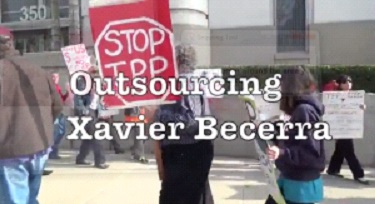
As some anti-TPP activists in Los Angeles showed in a great street theater action in front of the offices of Rep. Xavier Becerra (D-CA), Fast Track makes Congress unnecessary. They brought the “TPP movers” to his office and outsourced him. It is important for activists to know what is in Fast Track because the US Trade Representative has been doing its best to mislead the public.
Time to Finish the Job, Make Fast Track for the TPP Politically ToxicThe movement against the TPP has come a long way in the last year from challenging a trade agreement that no one knew about and looked like it could not be stopped; to a trade agreement widely known about in activist circles and which is becoming too toxic for elected officials to be associated with in an election year.
The reason we have come this far is because the TPP affects so many aspects of every person’s lives – food, the environment, workplaces, the Internet, banking and finance, job availability, health care, energy, the list goes on and on. As people learn about the TPP and what it does they oppose it. While lame ducks like Obama and Baucus who do not have to seek re-election, can ignore angry constituents and follow the demands of big money, those seeking re-election do not have that luxury.
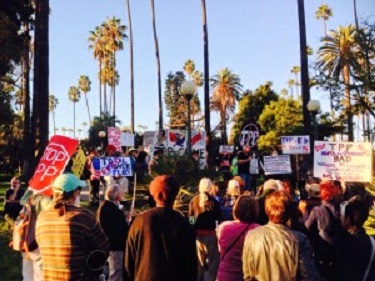
Our task: We need to continue to build opposition and show elected officials they do not want to be associated with these toxic trade agreements. They need to understand that fast-tracking the TPP could end their career. A lot is already planned. To stay informed “like” the Flush The TPP Facebook page and follow the twitter feed where we will be regularly publishing new sharable memes to continue to build the stop the TPP movement. If more TPP leaks come out, we’ll provide immediate analysis. If there are hearings we will organize protests to make sure the voices of opposition are heard and share that information.
Every Tuesday there is a TPP twitter storm at 9 PM Eastern. Follow the hashtag #TPPMediaMarch to participate. There will be a special TPP storm during the State of the Union on January 28.
Scores of organizations have come together in a movement of movements to create a webpage StopFastTrack.org. We’ve planned ten key days of pressure on Congress from January 22 to January 31. During this period, people will be making phone calls to Congress through the website which will provide simple tools to call Congress. In addition, during this period, people are organizing for the State of the Union on January 28 and an Inter-Continental Day of Action on January 31. During the State of the Union, people opposed to the TPP plan to stand vigil outside of the Congress beginning at 8:30 so they can be there when the president arrives for the speech that begins at 9 PM. During the speech a special State Of The Union TwitterStorm will be held from 9-10pm EST, follow #TPPMediaMarch to participate.
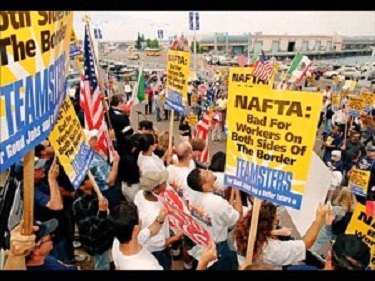
On January 31 there will be an Inter-Continental Day of Action against the TPP & Corporate Globalization. The theme is ‘No More NAFTA’s as this month is the twenty-year anniversary of NAFTA, which has had devastating consequences for working families, small farmers, indigenous peoples, small business and the environment in all three countries and beyond. The pending Trans-Pacific Partnership (TPP) has been described as “NAFTA on Steroids.”
We have come an incredible distance and the likelihood of stopping the TPP is stronger than it ever has been.The president and transnational corporations will make an aggressive push to pass Fast Track this month. It is our job to stop them and make it impossible to bring Fast Track or the TPP up again. We can accomplish this and when we do it will be a tremendous victory of the people over transnational corporate power!

From Nation of Change:
The Sierra Club responded to the latest news saying that if the [TPP] draft report were to be finalized, "President Obama's environmental trade record would be worse than George W. Bush's."
Japan has been a hotbed of protest against the Trans-Pacific Partnership, which would establish a free-trade zone stretching from Japan to the United States to Chile, and encompass nearly 40 percent of the global economy. Now, new documents released by WikiLeaks show the White House may be ready to backtrack on a series of critical regulations in order to secure a deal on the trade pact, including legally binding requirements for pollution limits, logging standards, and a ban on the harvesting of shark fins. The draft version of the "environmental chapter" also reveals that the United States and 11 other Pacific Rim nations that are party to the TPP would rely on trade sanctions instead of fines if a country violates its obligations. The Sierra Club responded to the latest news saying that if the draft report were to be finalized, "President Obama's environmental trade record would be worse than George W. Bush's." Meanwhile hearings begin today in Congress on legislation to establish fast-track authority that would allow Obama to sign the TPP before Congress votes on it.
Broadcasting from Tokyo, we're joined by Nobuhiko Suto, a former member of the Committee on Foreign Affairs in Japan's House of Representatives, where he was among the first legislators to point out the dangers of the TPP. He is the Secretary-General of the group, Citizen's Congress for Opposing the Trans-Pacific Partnership. We're also joined on the phone by Lori Wallach, director of Public Citizen's Global Trade Watch based in Washington, D.C.
Tweet ABOUT AMY GOODMANAmy Goodman is the host of "Democracy Now!," a daily international TV/radio news hour airing on more than 900 stations in North America. She is the author of "Breaking the Sound Barrier," recently released in paperback and now a New York Times best-seller.





Red Jos: HUMAN RIGHTS ACTIVISM
Mannie and Kendall Present: LESBIAN AND GAY SOLIDARITY ACTIVISMS
Mannie's weblogs may be accessed directly by clicking on to the following links
Activist Kicks Backs - Blognow archive re-housed - 2005-2009
RED JOS BLOGSPOT (From January 2009 onwards)

This page created on 12 DECEMBER 2013 and updated on 23 NOVEMBER 2016
PAGE 179